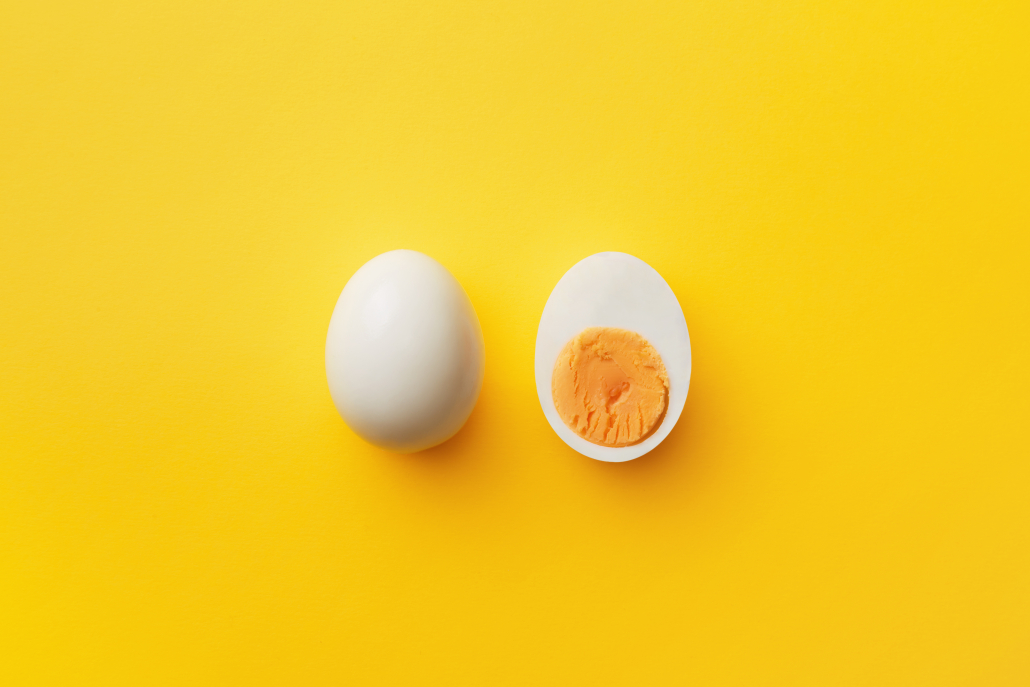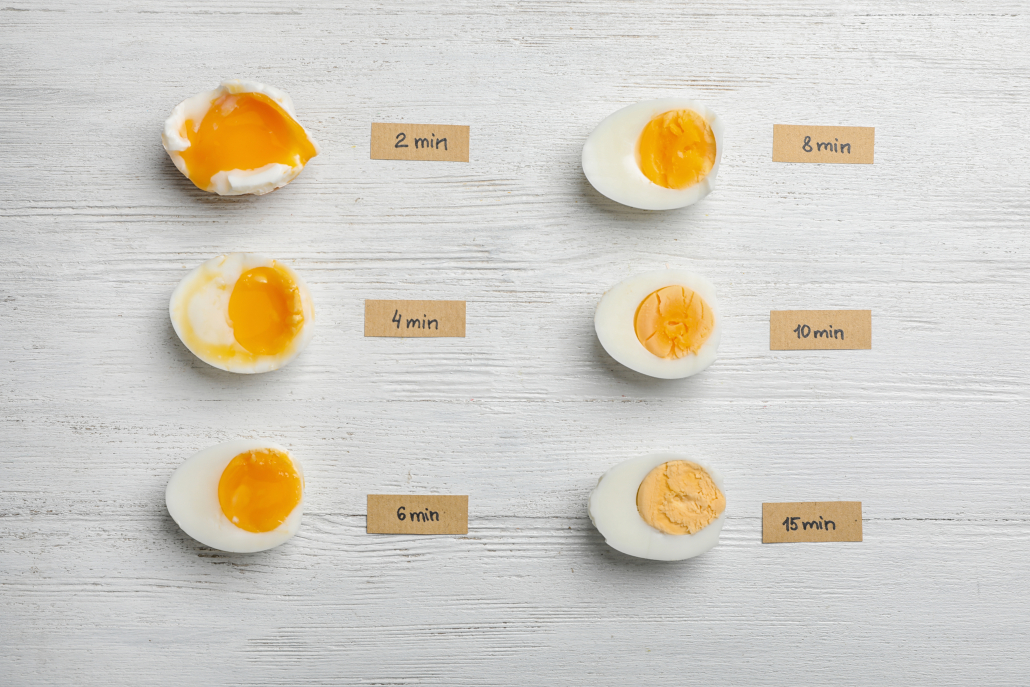We include products in articles we think are useful for our readers. If you buy products or services through links on our website, we may earn a small commission.
Are Hard Boiled Eggs Good for You? The Whole Truth

Table of Contents
Hard boiled eggs are a convenient source of protein and loaded with important nutrients like B vitamins, choline, and selenium. Yet they’re also high in fat and cholesterol.
So, are hard boiled eggs good for you?
This is really a two-part question, and the verdict depends on whether:
- the fat and cholesterol in eggs make them unhealthy?
- boiling eggs makes them more or less healthy when compared to other ways of preparing them?
Let’s take a look at what the most recent research tells us…
Are Eggs Healthy?
Eggs have been one of the most unfairly demonized foods. Yet despite what nutritionists from the 1990s will tell you, eggs are very healthy!
The prohibition against eggs has mainly been due to the outdated view that the cholesterol we eat raises the cholesterol in our blood.
Cholesterol in Hard Boiled Eggs
It’s true that eggs are one of the highest cholesterol foods on earth. A single hard-boiled egg is loaded with 212 mg of cholesterol, or 71% of the RDA.
For 50 years these numbers raised the alarm for most doctors and nutritionists.
The Egg Cholesterol Myth
However, modern clinical research has revealed a surprising truth: For the vast majority of people, dietary cholesterol has very little effect on blood cholesterol.2 3
These studies make clear that eating cholesterol-rich foods like hard boiled eggs is not associated with heart disease, and does not increase LDL “bad “ cholesterol levels.2 3
On the contrary, studies show that eating eggs may actually improve “good” HDL cholesterol
But what happens to the LDL “bad” cholesterol?
Studies show that for 70% of people, these is no increase in LDL and total cholesterol. For the remainder to do see an increase–it is generally very small, and of a benign type of LDL that has no effect on heart health.
Other research shows that it’s not the cholesterol in food that we should be worried about but the carbs.
When you get more than 60% of your calories from carbs, you’re lowering your “good” HDL cholesterol, while raising triglycerides–both big “no nos” for your heart health.7
Can I Eat Boiled Eggs every day?
If eating eggs doesn’t increase “bad” LDL cholesterol, and increases “good” HDL, can you eat boiled eggs every day?
Yes, eating boiled eggs every day is likely healthy.
Two recent studies involving over 100,000 healthy participants showed that eating one egg every day did not increase the risk of heart disease. 2
But the safety of eating boiled eggs every day extends even to people with heart disease risk factors!
A 2017 meta-analysis compiling data from numerous studies revealed that even at-risk populations can safely consume at least seven eggs per week. [4]
And in 2013, a meta-analysis in the British Medical Journal, showed that eating eggs every day did not increase risk of coronary, and will also not increase your risk of stroke. 2
More good news for daily egg eaters comes from a huge 500,000 person study in china. Researchers found that people who ate eggs every day enjoyed a 14% lower risk of major cardiac events, an 11% lower risk of cardiovascular disease, 12% lower risk of ischemic heart disease, and an 18% reduction in risk of CVD death. [6]
Calories in Boiled Eggs
When considering boiled eggs’ robust nutrient profile, they’re surprisingly low in calories.
One hard-boiled egg contains only 77 calories, and a standard serving of 2 boiled eggs has 144 calories.
The calories in eggs come mostly from the 6.5 grams of lean protein, and 5.5 grams of healthy fat, with only .5 carbs.
Eggs are also a complete protein, meaning they offer the full range of essential amino acids.
Hard Boiled Eggs Nutrition
Now that it’s clear that hard boiled eggs aren’t the dietary black sheep they’ve been made out to be, let’s explore the nutrition benefits that you may have been missing out on.
8 Nutrition Benefits of Hard Boiled Eggs
- Eggs are the most inexpensive source of high quality protein with 6.5 grams per 1 egg.
- With all 9 essential amino acids–they’re a complete protein
- One hard boiled egg provides 147 mg of choline–27% RDA. For pregnant women, choline can reduce the risk of birth defects. Choline deficiency in both men and women may lead to muscle damage and fat accumulation in the liver
- A great source of vitamins A–necessary for healthy eyes
- Provides vitamins A, E, B2, B6, and B12. Together these nutrients dilate blood vessels, reducing cholesterol accumulation in the arteries
- Provides the antioxidants lutein and zeaxanthin which are protective against cataracts and macular degeneration
- Hard boiled eggs are convenient and satiating, reducing the likelihood of eating less healthy foods
- The “good” HDL cholesterol in scrambled can remove “bad” LDL from your bloodstream. It also offers antioxidant properties. [20]
Eat the Whole Egg: Yolk and Whites
To get all the nutrients and health benefits from eggs, it’s important to eat the whole egg–yolk and whites. Most of an egg’s nutrients are found exclusively in the yolk.2
Though egg whites are primarily protein, half the protein in an egg is also found in the yolk. 2
Nutrition facts per 1 large pasture-raised hard boiled egg:
Macronutrients
| Calories | 75 | 5% |
| Fat | 5.5 | 8% (N/A for Keto/ Low-Carb) |
| Saturated Fat | 1.5 | 5% (N/A for Keto/ Low-Carb) |
| Protein | 6.5 | 14% |
Vitamins
| Vitamin A | 400 IU | 8% |
| Vitamin D | 44IU | 7% |
| Vitamin E | 1.2 mg | 6% |
| Riboflavin | .3 mg | 20% |
| Folate | 24 mcg | 6% |
| Vitamin B6 | .1mg | 4.5% |
| Vitamin B12 | .6 mcg | 23% |
| Pantothenic Acid | .7 mg |
Minerals
| Nutrient | Amount | DV |
| Calcium, Ca | 28.00 mg | 2 % |
| Copper, Cu | 0.036 mg | 4 % |
| Fluoride, F | 0.6 mcg | |
| Iron, Fe | 0.88 mg | 5 % |
| Magnesium, Mg | 6.00 mg | 2 % |
| Manganese, Mn | 0.014 mg | 1 % |
| Phosphorus, P | 99.00 mg | 14 % |
| Potassium, K | 69.00 mg | 1 % |
| Selenium, Se | 15.3 mcg | 28 % |
| Sodium, Na | 71.00 mg | 3 % |
| Zinc, Zn Choline | 0.65 mg 147mg | 6 % 27% |
Proteins and Amino Acids
| Nutrient | Amount | DV |
| Protein | 6.28 g | 13 % |
| Alanine | 0.367 g | |
| Arginine | 0.410 g | |
| Aspartic acid | 0.664 g | |
| Cystine | 0.136 g | |
| Glutamic acid | 0.837 g | |
| Glycine | 0.216 g | |
| Histidine | 0.154 g | 22 % |
| Isoleucine | 0.336 g | 24 % |
| Leucine | 0.543 g | 20 % |
| Lysine | 0.456 g | 22 % |
| Methionine | 0.190 g | |
| Phenylalanine | 0.340 g | |
| Proline | 0.256 g | |
| Serine | 0.485 g | |
| Threonine | 0.278 g | 26 % |
| Tryptophan | 0.083 g | 30 % |
| Tyrosine | 0.249 g | |
| Valine | 0.429 g | 24 % |
| Phenylalanine + Tyrosine | 0.589 g | 34 % |
| Methionine + Cysteine | 0.190 g | 18 % |
On their own, the nutrition of hard boiled eggs is compelling. But to see how truly impressive eggs are, compare them to the nutrients in “healthy” vegetables:
https://www.doctorkiltz.com/eggs-are-good-for-you/
Hard Boiled Egg Nutrient Highlights
The protein in hard boiled eggs gets all the credit, but there are a few other nutrients that deserve some serious attention.
Choline
Choline is produced in small amounts in the body, but you have to get most of it from your food. And most Americans are choline deficient.2 3
Eggs just happen to be the most concentrated source of choline in most people’s diet.
The choline you get from boiled eggs is vital for many important functions, including:
- Nervous system health 2
- Memory and learning–when metablolized into the neurotransmitter acetylcholine 3
- Fetal brain development
- Cognitive health as you age 3
- For pregnant women, choline decreases risk of neurological defects in the fetus 3
Lutein and Zeaxanthin
This duo of powerful antioxidants play a starring role in the health of our eyes. They do battle with free-radicals that can accumulate in your eyes. 2 4
Studies show that they protect against age-related macular degeneration (AMD).3 And they can slow the formation of cataracts.3
For people who spend a lot of time in front of computer screens (and who doesn’t these days?), These two carotenoids may even be protective against damaging blue light. 3 4
But make note, these nutrients are only found in the yolks!
Hard boiled Eggs May Help You Lose Weight
Since hard boiled eggs are extremely satiating and relatively low in calories, researchers have explored their role in helping you lose weight.
In a 2005 study each morning obese participatns were randomly served one of two breakfasts.
Breakfast A was eggs. Breakfast B was bagel-based. Both had equal calories.
After two weeks researchers discovered that the egg-breakfast, “induced greater satiety and significantly reduced short-term food intake.”
A 2013 study revealed that egg-based breakfasts resulted in subjects eating 270-470 fewer calories at a buffet lunch and dinner that same day.
Significantly, there is no research showing that eating eggs can lead to weight gain.
Hard-Boiled vs. Fried and Scrambled Eggs
Boiled eggs are made by boiling unshelled eggs in water.
Soft boiled eggs cook from 2-8 minutes, and hard boiled eggs take around 12 minutes.

As with most foods, cooking them can reduce some nutrients. But with hard boiled eggs there is a minimal loss and degradation compared to baking, frying, and scrambling eggs.
Studies show that baking eggs for 40 minutes can cause a 61% reduction in vitamin D. But when boiled or fried for shorter times, they only lose up to 18%. 2
Other studies reveal that cooking eggs can reduce their antioxidants by 6–18%.
But cooking eggs has its upsides: The protein becomes much more digestible and available for use in the body.
When comparing raw and cooked eggs, studies have found that the body can use 91% of the protein in cooked eggs vs. only 51% in raw eggs.
Boiling Eggs Protects Against Cholesterol Oxidation
Exposing the cholesterol in eggs to high heat can cause it to become oxidized forming potentially harmful compounds called oxysterols.
These compounds have been linked to increased heart disease risks.
Boiling eggs protects the cholesterol–mainly stored in the yolk–from high heat contact.
But even scrambled and fried eggs pose little risk. The vast majority of dietary oxysterols come from friend junk food like french fries and fried chicken.
It’s also worth highlighting that the cholesterol that becomes oxidized in the body from consuming processed foods and added sugars is far more dangerous than dietary oxidized cholesterol.
When considering the healthiest way to cook eggs, it’s good to keep in mind that for healthy people, there are ZERO studies linking eggs prepared in any way with an increased risk of heart disease.
What are the Healthiest Eggs To Boil?

The happier the hens the healthier the eggs. And the happiest hens are pasture-raised certified humane and certified organic.
A 2007 survey by Mother Earth News compared 14 flocks of truly pasture-raised egg producers to USDA caged eggs. The survey found pasture-raised eggs contained:
- 700% more beta carotene
- 1/3 less cholesterol
- 2/3 more vitamin A
- 200% more omega-3 fatty acids
- 300% more vitamin E
- Another study found pasture-raised eggs have higher vitamin D
| Values per 100 grams | Vitamin E | Vitamin A | Beta Carotene | Omega-3s | Cholesterol |
| Eggs from Caged Birds | .97mg | 487IU | 10mcg | .22g | 423mg |
| Pasture-Raised Eggs | 3.73mg | 792IU | 79.03mgc | .66g | 277mg |
For an in-depth guide to understanding egg labels and buying the best eggs, click here
Are there Healthier Ways to Prepare Eggs?
If your goal is to get the maximum nutrients out of your eggs, poaching them is likely the healthiest preparation. It’s relatively low heat, quick, and keeps your yolks intact.
You can poach an egg by simmering water between 160–180°F (71–82°C). Crack the eggs in, and let cook for 2–3 minutes.
Are Hard Boiled Eggs Good for You? The Takeaway
Hard boiled eggs are great for you!
Hard boiled eggs are one of the most nutrient dense foods on earth, and prepared in a way that protects their cholesterol from oxidation.
After more than 50 years of misinformation and demonization, eggs are finally being let out of the dietary cage.
Recent research has set the record straight: For healthy people, eggs actually improve cholesterol levels and have zero links to heart disease.
For the most nutritious eggs, choose pasture-raised and certified organic.




















